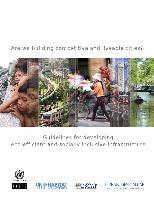Are we building competitive and liveable cities?: Guidelines for developing eco-efficient and socially inclusive infrastructure
Resource information
Date of publication
December 2011
Resource Language
ISBN / Resource ID
CEPAL:11362/37700
Pages
125
This guideline jointly published by The UN Economic and Social Commission for Asia and the Pacific (ESCAP), the UN Economic Commission for Latin America and the Caribbean (ECLAC), and the UN Human Settlements Programme (UN-HABITAT), in partnership with the Urban Design Lab of the Earth Institute, Columbia University, provides practical tools for city planners and decision makers to reform urban planning and infrastructure design according to the principles of eco-efficiency and social inclusiveness. It includes case studies from the Republic of Korea, the Philippines, Japan and Sri Lanka.



